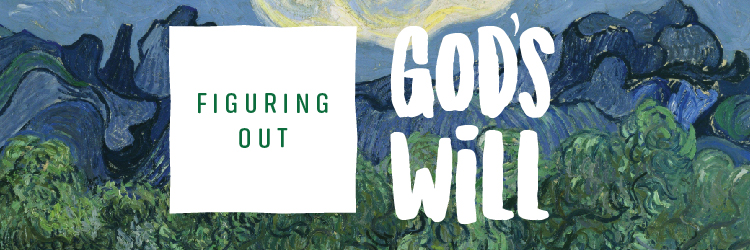So far, we’ve seen that God’s Will is good and is not meant to be difficult to discern. God gives us many clearly stated commands in Scripture to follow and direct access to His wisdom by simply asking Him for it (James 1:5). Yet, God is not in existence merely to guide us to the best plan. And we are not in existence just so He can tell someone what to do. God’s desire is to be in relationship with us. Part of our error comes when we go to Him only for what He can do rather than for who He is.
Sometimes this looks like when people begin to make “deals” with God or try to discover God’s Will through signs, wonders, penance, payments, and means of verification (cleromancy – rolling dice, casting lots, flipping a coin). People become so overburdened with the decision at hand. They don’t want to make a mistake and they don’t seem to be getting a clear answer from God. Sometimes, people aren’t comfortable with where God seems to be leading them that they begin to question God and ask for a clearer sign of “go” or “no” (i.e. Gideon – his request for signs displayed his mistrust and doubt in God’s guidance – Judges 6:36-40).
King Saul (in the Old Testament) made his grave mistake by trusting in the ritual of offering a sacrifice to hear from God rather than trusting in the God-given process of seeking Him through obedience and patience (1 Samuel 13:8-13). To God, this is the same as divination which is trying to get revelation about the future and about God’s secret plans by using demonic means or means that involve transactions with the dead. King Saul also does such a thing later in life by asking for a medium, so he can talk to the deceased prophet Samuel (1 Samuel 28).
The Apostle Peter and John (in the New Testament) lead Simon, a magician, to Christ and Simon followed them around. During their ministry journeys, they laid their hands on some Samaritans to receive the Holy Spirit after their conversion (God was showing them how His salvation was not only for the Jews). Simon seeing that people received the Holy Spirit through the laying on of hands, asked to receive such ability and he would pay them for it. Peter responded:
“May your silver perish with you, because you thought you could acquire God’s gift with money!” (Acts 8:20)
See, the problem with asking for signs and wonder for direction is that it puts more trust in the object than in God. It is why God forbid the use of superstition practices (Deuteronomy 18:10-11). The Old Testament prophet Isaiah warned the people against using charms, incantations, and astrology to guide and protect them (Isaiah 47:11-15). Those things can do nothing against or to alter God’s Will.
People today still use many such forms of trying to understand the future and to protect themselves from calamity rather than seeking and trusting God. There are palm readers, fortune-tellers, and even Jesus bobbleheads. People wear cross necklaces, keep a Bible in their car, or light a candle to a saint. People can even use religious activity such as prayer, giving, and serving as a hope to gain God’s favor for protection or for an answer to their decisions. Just as the prophet Samuel told King Saul, God is more concerned with our obedience than with our sacrifice. He’s concerned with our hearts and our relationship with Him. We may never experience guidance from God if the only time we go to God is to get guidance.
For I desire loyalty and not sacrifice, the knowledge of God rather than burnt offerings. (Hosea 6:6)
PAUSE AND PRAY
Take a few moments and ask God to reveal any ways you have trusted in objects or even religious activity to seek His guidance more than seeking Him in a personal way. Ask God for forgiveness in the way you have done that. Take comfort that God’s Will is not meant to be difficult to find and there is no need to put your trust in those things.
This is part of a 4 week devotional plan for the series “Figuring Out God’s Will.” For complete details, see here.

